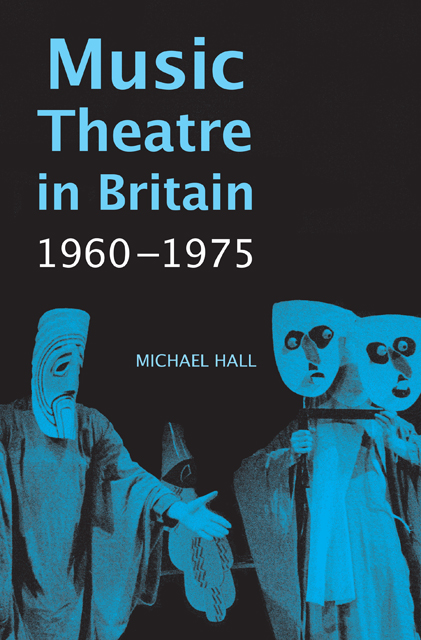10 - Game Playing and Clowning
Published online by Cambridge University Press: 23 February 2023
Summary
Interest in basing Music Theatre on children’s games arose in 1957, when David Holbrook published an anthology of sixty-five games ‘to give some indication of the fine qualities of these songs, dances and rituals which made up the unwritten culture of the English child.’ Among the composers who read Holbrook’s book was David Lumsdaine. Although he never made use of the games it describes in his own music, he recommended the book to John Tavener, his former composition student, when he was looking for a children’s funeral game to be enacted alongside the adult contributions in the Celtic Requiem he was planning to write for the London Sinfonietta. To meet his requirements, Tavener selected not only Jenny Jones, which Holbrook had drawn particular attention to for its theatricality, but also other singing games dealing with death and resurrection.
Holbrook’s was not the only book to discuss children’s games in the late sixties. In 1969 Clarendon Press published Iona and Peter Opie’s Children’s Games in Street and Playground, which included 170 games collected from all over the British Isles, although their book did not discuss Jenny Jones or others mentioned by Holbrook. Then, in 1970, Cambridge University Press published Sound and Silence: Classroom Projects in Creative Music by John Paynter and Peter Aston. This was a highly influential book based on the work done by two composers at York University, who wanted music teachers to encourage children and young people to compose music for themselves. Their book ends with suggestions for dramatic works children could invent. Their belief was that ‘the child-like sense of wonder can perhaps best be expressed in terms of magic and ritual. It demands action, and the music of its rituals is part of the action. It is theatre.’
Eventually, despite the interest these books created, only Tavener, Maxwell Davies and John Buller produced works based on children’s games. These were Celtic Requiem (Tavener), Blind Man’s Buff (Maxwell Davies), The Mime of Mick, Nick and the Maggies and Finnegan’s Floras (Buller). However, all four require larger forces than is normal for Music Theatre. They last respectively twenty-five, twenty, seventy and twelve minutes, and all need a stage director.
- Type
- Chapter
- Information
- Music Theatre in Britain, 1960–1975 , pp. 224 - 252Publisher: Boydell & BrewerPrint publication year: 2015



